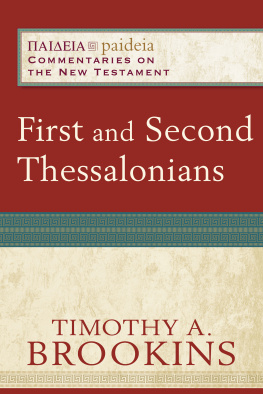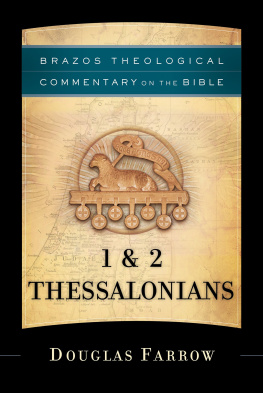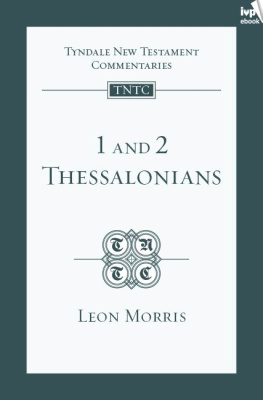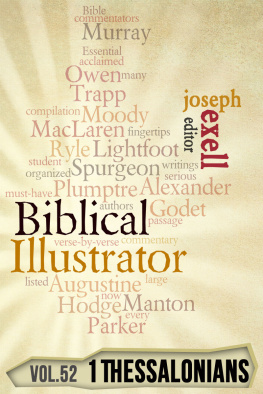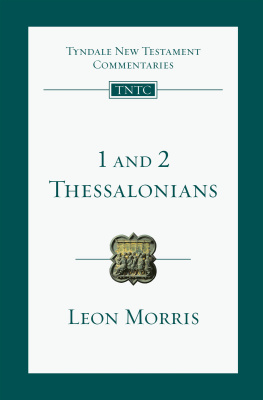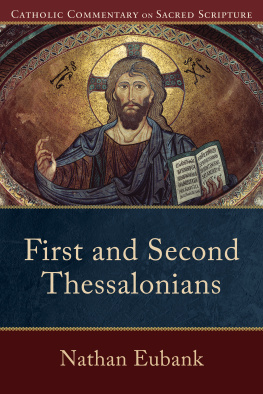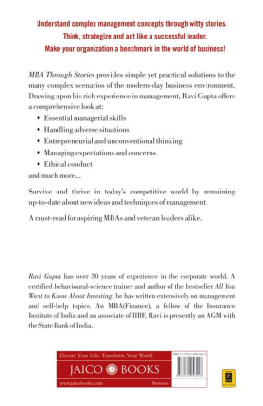Nijay K. Gupta - 1-2 Thessalonians
Here you can read online Nijay K. Gupta - 1-2 Thessalonians full text of the book (entire story) in english for free. Download pdf and epub, get meaning, cover and reviews about this ebook. year: 2016, publisher: Cascade Books / Wipf and Stock, genre: Religion. Description of the work, (preface) as well as reviews are available. Best literature library LitArk.com created for fans of good reading and offers a wide selection of genres:
Romance novel
Science fiction
Adventure
Detective
Science
History
Home and family
Prose
Art
Politics
Computer
Non-fiction
Religion
Business
Children
Humor
Choose a favorite category and find really read worthwhile books. Enjoy immersion in the world of imagination, feel the emotions of the characters or learn something new for yourself, make an fascinating discovery.

- Book:1-2 Thessalonians
- Author:
- Publisher:Cascade Books / Wipf and Stock
- Genre:
- Year:2016
- Rating:3 / 5
- Favourites:Add to favourites
- Your mark:
- 60
- 1
- 2
- 3
- 4
- 5
1-2 Thessalonians: summary, description and annotation
We offer to read an annotation, description, summary or preface (depends on what the author of the book "1-2 Thessalonians" wrote himself). If you haven't found the necessary information about the book — write in the comments, we will try to find it.
1-2 Thessalonians — read online for free the complete book (whole text) full work
Below is the text of the book, divided by pages. System saving the place of the last page read, allows you to conveniently read the book "1-2 Thessalonians" online for free, without having to search again every time where you left off. Put a bookmark, and you can go to the page where you finished reading at any time.
Font size:
Interval:
Bookmark:
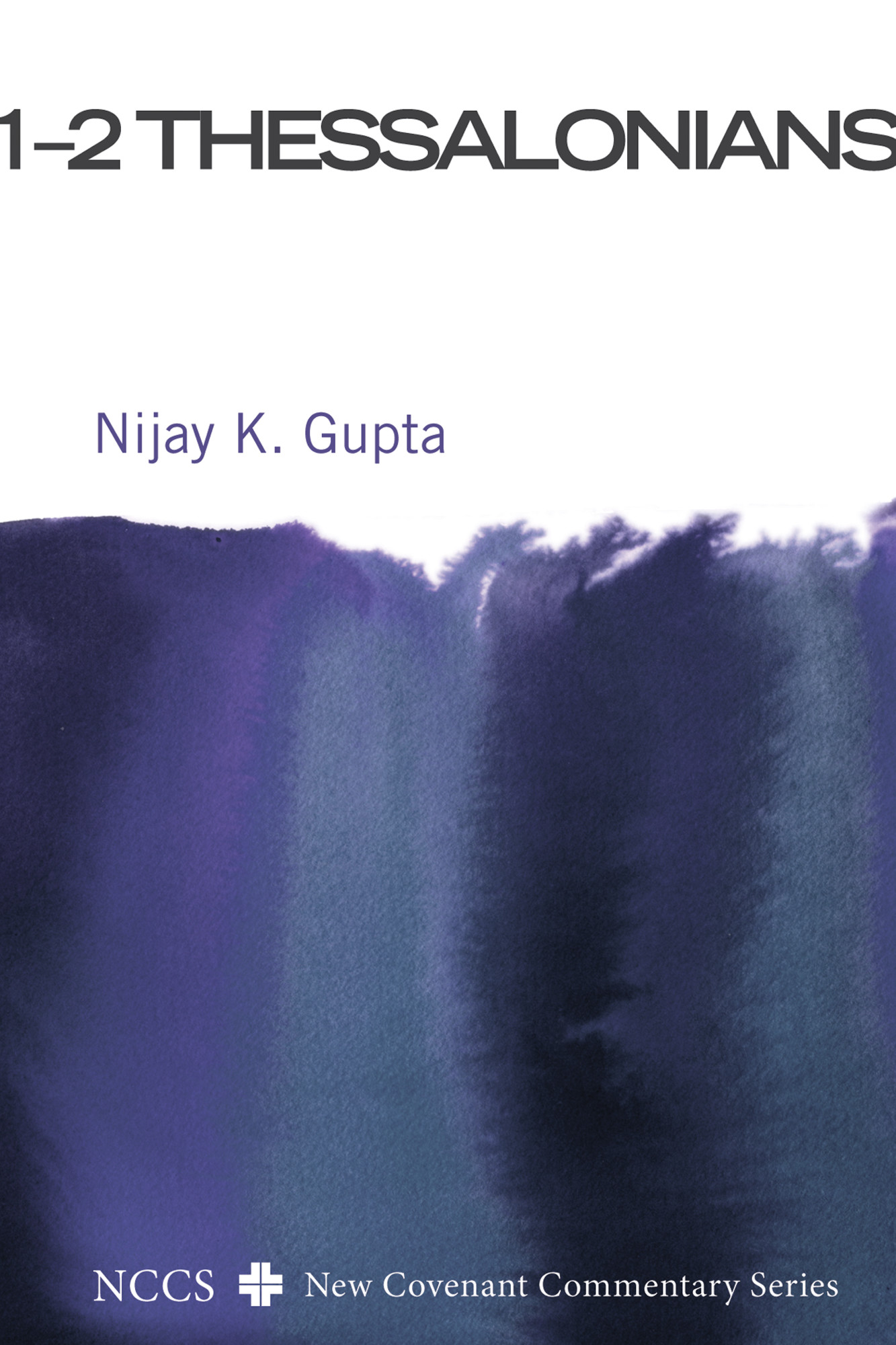
To say that researching for and writing this commentary was a delight would be an understatement. It was an act of joyful sanctification to bathe myself in the Greek and English texts of 12 Thessalonians on nearly a daily basis for a couple of years. Sometimes it is questioned whether yet another commentary is needed, not least on 12 Thessalonians where there are already a number of good works on the shelves. My perspective is that it is an ongoing exercise of hearing the Word of God afresh. I was eager to write this commentary for the joy of my own learning, and doing theological reasoning about what these letters mean for us today. As I have had opportunities to share some of my research and findings with students, I have become more and more convinced that 12 Thessalonians are too-often-overlooked gems in Scripture. We glimpse some of the most striking moments of Paul as vulnerable, humble pastor and friend. We get a sense for how Paul calls believers to respond to suffering. We learn about the dignity and worth of good, honest labor as productive work as well as public witness to the gospel. First and Second Thessalonians have a unique ability to speak to us, not in spite of the fact that they do not instruct in a general and generic manner, but because they are so heavily contextualized. We are privileged to catch a glimpse of Pauls real life, real relationships, and real struggles. And we see an Apostle, his apostolic companions, and his fellow believers come together as a household of faith under God the Father and through the unique Son, Messiah Jesus, to encourage one another. It is a beautiful display of the church.
My thanks go to the series editors, Michael Bird and Craig Keener, for the invitation to be involved in this series. I am especially grateful for their vision to acquire a globally diverse set of authors, and for their being mindful about including voices of women and ethnic minorities. There were a number of scholars who were kind enough to share with me unpublished materials on the Thessalonian Correspondence; my gratitude goes to them: Karl Donfried, Gene Boring, Todd Still, John Byron, Andy Johnson, Steve Walton, and Michael Gorman.
I presented some of my research findings to the Biblical Ethics group of the Society of Biblical Literature, and my appreciation goes to them for creating an opportunity for helpful feedback. Also, two students at George Fox SeminaryEvan Simmons and Daniel Belajourneyed with me through the Greek text of 12 Thessalonians over the course of the 201415 year contributing many insights into these texts and stimulating my own curiosity. I would also like to thank the George Fox University and Seminary Faculty Development Committee for awarding me a period of research leave to complete this book (Grant GFU 2015 L).
This commentary is dedicated to my family: my wife, Amy, for her patience when I was working intensely on this book, and her Christian model as loyalty that works... love that labors... and endurance driven by hope in our Lord Messiah Jesus ( Thess 1:3 ); for my children (Simryn, Aidan, and Libby) for the play-filled delight they bring to my life. They are my glory and joy ( Thess 2:20 )!
(NB: In the commentary, we have preferred to use Messiah instead of Christ. Secondly, all biblical quotations are from the NRSV except for 1-2 Thessalonians where I have supplied my own translation. When there are any exceptions, they are marked.)
ABAnchor Bible Commentary
ACCSAncient Christian Commentary on Scripture
AJPS Asian Journal of Pentecostal Studies
ANTCAbingdon New Testament Commentary
BBRBulletin for Biblical Research
BECNTBaker Exegetical Commentary on the New Testament
BNTCBlacks New Testament Commentary
BTBBiblical Theology Bulletin
BZNW Beihefte zur Zeitschrift fr die neutestamentliche Wissenschaft
CBQ Catholic Biblical Quarterly
CBRCurrents in Biblical Research
CTJCalvin Theological Journal
DPLDictionary of Paul and His Letters
EBCExpositors Bible Commentary
EKKNTEvangelisch-Katholischer Kommentar zum Neuen Testament
ExpTimExpository Times
HTR Pearson Harvard Theological Review
HTS Hervormde Teologiese Studies
ICCInternational Critical Commentary
JBLJournal of Biblical Literature
IVPNTCInterVarsity Press New Testament Commentary
JSNTJournal for the Study of the New Testament
JSNTSupJournal for the Study of the New Testament Supplement Series
JTIJournal of Theological Interpretation
L-NLouw-Nida, Greek-English Lexicon of the New Testament
LNTSLibrary of New Testament Studies
NCBNew Century Bible
NIBNew Interpreters Bible
NICNTNew International Commentary on the New Testament
NIDBNew Interpreters Dictionary of the Bible
NIGTCNew International Greek Testament Commentary
NIVACNew International Version Application Commentary
NTLNew Testament Library
NTR New Testament Readings
NTSNew Testament Studies
NTTNew Testament Theology
PASTPauline Studies
PNTCPillar New Testament Commentary
RHPR Revue dHistoire et de Philosophie Religieuses
SBLDSSociety of Biblical Literature Dissertation Series
SoGBCStory of God Biblical Commentary
SHBCSmyth & Helwys Bible Commentary
SNTSMSSociety of New Testament Studies Monograph Series
SPSacra Pagina
TLZTheologische Literaturzeitung
WBCWord Biblical Commentary
WUNTWissenschaftliche Untersuchungen zum Neuen Testament
ZECNTZondervan Exegetical Commentary on the New Testament
ZTKZeitschrift f r Theologie und Kirche
Everything that is done in the world is done by hope Luther
Hope means hoping when everything seems hopeless G.K. Chesterton
Faith goes up the stairs that love has built and looks out the windows which hope has opened. Charles Spurgeon
Pauls message to the Thessalonian church in 1 Thessalonians can be summarized in one wordhope. Hope, for Paul, was not a word representative of mere longings or wishful thinking. It was, not unlike we see in Hebrews, something certain, but invisible. Hope was the word Paul used to talk about the invisible (but real) future promised by the invisible (but real) God who gave the most certain assurances of the fulfillment of his promises in the death and resurrection of Messiah Jesus as well as the deposit of the Holy Spirit.
The word hope only appears a handful of times in these letters (1 Thess 1:3; 2:19; 4:13; 5:8; 2 Thess 2:16), but it represents well Pauls central emphasis: in the tumult, chaos, confusion, and rough-and-tumble of life, you must trust God and Gods future by moving forward in faith and faithfulness. Hope is his word for a targeted faith, anticipatory faith, quite similar to what we see in Heb 11:13. According to Hebrews, the Old Testament people of faith did not live in the world of the final fulfillment of Gods promises, but saw it all from a distance and welcomed it (NLT). Another translation says they greeted it from afar (RSV). While they obviously never reached it, they mapped their journey towards it, as it were, and ran with outstretched arms. Their job, in their time, was not to get to the destination, but to live their present life in the light of that hope, to navigate their vessel (to change the metaphor) according to that beacon.
Hope, in the Christian vocabulary, is a worldview word. If faith represents the reliance on an alternative reality based on the revelation of God according to his work and words vis--vis the past and present , then hope involves the sustaining of a present alternative view of reality based on what God has promised to do in the future . Christians do not look ahead simply in order to be done with life and float away to eternal bliss in heaven. They lean on hope to survive, live, and even thrive in the present by seeing through Gods eyes, and particularly Gods promises about what he is going to do.
Font size:
Interval:
Bookmark:
Similar books «1-2 Thessalonians»
Look at similar books to 1-2 Thessalonians. We have selected literature similar in name and meaning in the hope of providing readers with more options to find new, interesting, not yet read works.
Discussion, reviews of the book 1-2 Thessalonians and just readers' own opinions. Leave your comments, write what you think about the work, its meaning or the main characters. Specify what exactly you liked and what you didn't like, and why you think so.


